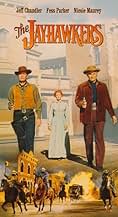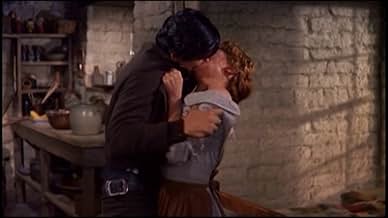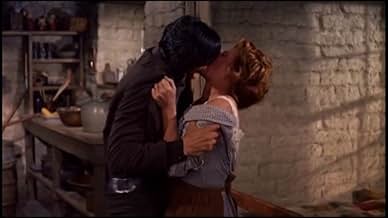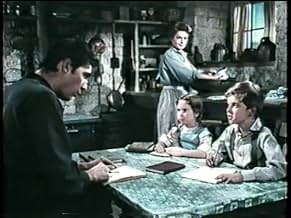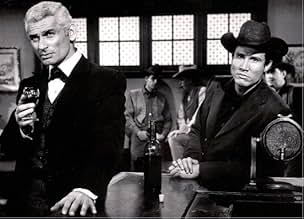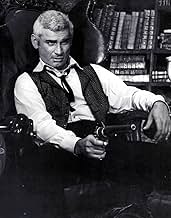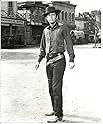Au Kansas, avant la guerre de Sécession, Luke Darcy est fermier. Il lutte pour empêcher qu'un groupe de brigands ne lui vole ses terres.Au Kansas, avant la guerre de Sécession, Luke Darcy est fermier. Il lutte pour empêcher qu'un groupe de brigands ne lui vole ses terres.Au Kansas, avant la guerre de Sécession, Luke Darcy est fermier. Il lutte pour empêcher qu'un groupe de brigands ne lui vole ses terres.
Al Wyatt Sr.
- Jayhawker
- (as Allan Wyatt)
Avis en vedette
"The Jayhawkers" was released in 1959 and starred Jeff Chandler as an ambitious person eager to control pre-War Kansas, and Fess Parker has to try and stop him in his scheme. Reason: Parker, as Cam Beeker, had broken out of a federal prison to try and come back to his wife, and his ranch in Kansas. He finds that his wife has died, and the ranch has been sold to a family, headed by French actress Nicole Maurey. He also learns that Luke Darcy, played by Chandler, was the reason behind his wife's death and the ranch being lost. Beeker becomes a member of the gang in order to win his pardon from the territorial governor of Kansas. Upon joining the gang of raiders calling themselves the Jayhawkers, he starts to accept the ambition of Darcy, because the man seems intent on bringing peace to the territory, but under his rule. The viewer of this watchable western will be asking which way Parker's character will finally go; either turn Darcy over to the governor, or become part of the plan to control the territory. A good 7/10
It's been a while since I saw this movie, but I remember being impressed with the performances of both Fess Parker and Jeff Chandler.
The other person who commented on this movie implied the Chandler character murdered Parker's wife. I don't think that's correct. He just dumped her and she killed herself, or some sort of indirect thing like that.
I've since heard part of the movie score on a soundtrack CD showcasing the music of Jerome Moross. Wow! No wonder I liked the movie, the score is really great with a driving main theme. Look for a CD called "The Cardinal - Classic Film Scores of Jerome Moross". There is 16 minutes of music from "The Jayhawkers".
The other person who commented on this movie implied the Chandler character murdered Parker's wife. I don't think that's correct. He just dumped her and she killed herself, or some sort of indirect thing like that.
I've since heard part of the movie score on a soundtrack CD showcasing the music of Jerome Moross. Wow! No wonder I liked the movie, the score is really great with a driving main theme. Look for a CD called "The Cardinal - Classic Film Scores of Jerome Moross". There is 16 minutes of music from "The Jayhawkers".
Shortly before the start of the American Civil War rebel Kansas leader Luke Darcy (Jeff Chandler) plans a new independent Republic of Kansas and craving for loot . His vigilante group is called The Jayhawkers and their depredations contributed to the descent of the Missouri-Kansas border region into some of the most vicious guerrilla fighting of the Civil War. Their mission is to end slavery by force but degenerating so completely into a squalid, murderous, slugging match . However, rebel leader Darcy uses The Jayhawkers for his own bid for absolute control of Kansas. Darcy's actions do not sit well with the military governor of Kansas, William Clayton (Herbert Rudley) , as the government command instituted martial law due to "the crime of armed depredations or jay-hawking having reached a height dangerous to the peace and posterity to the whole State (Kansas) and seriously compromising the Union cause in the border counties of Missouri. As William Clayton supposedly wants Darcy captured and brought to justice. For this aim the governor hires an ex-renegade rebel , Cam Bleeker (Fess Parker) , to join Darcy's group and capture their leader . Bleeker has a personal reason for wanting to see Darcy hanged and he's craving for revenge . Darcy was responsible for Bleeker wife's death while Bleeker was in prison .
Exciting film inspired by historical facts set during pre-American Civil War (1861-1865) in which the Jayhackers use guerrilla warfare to destroy targets and led by men set on revenge, invading peaceful towns , making violent raids in Kansas territory . The picture efficiently describes the atmosphere of violence and confrontation among bands and bloody assaults . Stars the known hero Fess Parker-pre Daniel Boone- as the ex-con and an ex-raider whom the military governor sends to capture Darcy well played by Jeff Chandler . Along with this excellent duo there are various notorious actors and familiar faces accompanying them such as : Nicole Maurey , Henry Silva , Herbert Rudley , Frank DeKova , Don Megowan , Leo Gordon , Jack Kruschen , Glen Stange , and Harry Dean Stanton. The motion picture was well directed by Melvin Frank.
The picture was based on historical events , these were the following ones : Jayhawkers and red legs are terms that came to prominence in Kansas Territory, during the Bleeding Kansas period of the 1850s ; they were adopted by militant bands affiliated with the free-state cause during the American Civil War . These gangs were guerrillas who often clashed with pro-slavery groups from Missouri, known at the time in Kansas Territory as "Border Ruffians" or "Bushwhackers." After the Civil War, the word "Jayhawker" became synonymous with the people of Kansas, or anybody born in Kansas. Today a modified version of the term, Jayhawk, is used as a nickname for a native-born Kansan. The meaning of the jayhawker term evolved in the opening year of the American Civil War. When Charles Jennison, one of the territorial-era jayhawkers, was authorized to raise a regiment of cavalry to serve in the Union army, he characterized the unit as the "Independent Kansas Jay-Hawkers" on a recruiting poster. The regiment was officially termed the 7th Regiment Kansas Volunteer Cavalry, but was popularly known as Jennison's Jayhawkers. Thus, the term became associated with Union troops from Kansas. After the regiment was banished from the Missouri-Kansas border in the spring of 1862, it went on to participate in several battles including Union victories of the Battle of Iuka and the Second Battle of Corinth. Late in the war, the regiment returned to Kansas and contributed to Union victory in one of the last major battles in the Missouri-Kansas theater, the Battle of Mine Creek. The Jayhawker term was applied not only to Jennison and his command, but to any Kansas troops engaged in punitive operations against the civilian population of western Missouri, in which the plundering and arson that characterized the territorial struggles were repeated, but on a much larger scale. For example, the term "Jayhawkers" also encompassed Senator Jim Lane and his Kansas Brigade, which sacked and burned Osceola, Missouri. In the first year of the war, much of the movable wealth in western Missouri had been transferred to Kansas, and large swaths of western Missouri had been laid waste, by an assortment of Kansas Jayhawkers ranging from outlaws and independent military bands to rogue federal troops such as Lane's Brigade and Jennison's Jayhawkers. In February 1862, the Union command instituted martial law due to "the crime of armed depredations or jay-hawking having reached a height dangerous to the peace and posterity to the whole State (Kansas) and seriously compromising the Union cause in the border counties of Missouri.
Exciting film inspired by historical facts set during pre-American Civil War (1861-1865) in which the Jayhackers use guerrilla warfare to destroy targets and led by men set on revenge, invading peaceful towns , making violent raids in Kansas territory . The picture efficiently describes the atmosphere of violence and confrontation among bands and bloody assaults . Stars the known hero Fess Parker-pre Daniel Boone- as the ex-con and an ex-raider whom the military governor sends to capture Darcy well played by Jeff Chandler . Along with this excellent duo there are various notorious actors and familiar faces accompanying them such as : Nicole Maurey , Henry Silva , Herbert Rudley , Frank DeKova , Don Megowan , Leo Gordon , Jack Kruschen , Glen Stange , and Harry Dean Stanton. The motion picture was well directed by Melvin Frank.
The picture was based on historical events , these were the following ones : Jayhawkers and red legs are terms that came to prominence in Kansas Territory, during the Bleeding Kansas period of the 1850s ; they were adopted by militant bands affiliated with the free-state cause during the American Civil War . These gangs were guerrillas who often clashed with pro-slavery groups from Missouri, known at the time in Kansas Territory as "Border Ruffians" or "Bushwhackers." After the Civil War, the word "Jayhawker" became synonymous with the people of Kansas, or anybody born in Kansas. Today a modified version of the term, Jayhawk, is used as a nickname for a native-born Kansan. The meaning of the jayhawker term evolved in the opening year of the American Civil War. When Charles Jennison, one of the territorial-era jayhawkers, was authorized to raise a regiment of cavalry to serve in the Union army, he characterized the unit as the "Independent Kansas Jay-Hawkers" on a recruiting poster. The regiment was officially termed the 7th Regiment Kansas Volunteer Cavalry, but was popularly known as Jennison's Jayhawkers. Thus, the term became associated with Union troops from Kansas. After the regiment was banished from the Missouri-Kansas border in the spring of 1862, it went on to participate in several battles including Union victories of the Battle of Iuka and the Second Battle of Corinth. Late in the war, the regiment returned to Kansas and contributed to Union victory in one of the last major battles in the Missouri-Kansas theater, the Battle of Mine Creek. The Jayhawker term was applied not only to Jennison and his command, but to any Kansas troops engaged in punitive operations against the civilian population of western Missouri, in which the plundering and arson that characterized the territorial struggles were repeated, but on a much larger scale. For example, the term "Jayhawkers" also encompassed Senator Jim Lane and his Kansas Brigade, which sacked and burned Osceola, Missouri. In the first year of the war, much of the movable wealth in western Missouri had been transferred to Kansas, and large swaths of western Missouri had been laid waste, by an assortment of Kansas Jayhawkers ranging from outlaws and independent military bands to rogue federal troops such as Lane's Brigade and Jennison's Jayhawkers. In February 1862, the Union command instituted martial law due to "the crime of armed depredations or jay-hawking having reached a height dangerous to the peace and posterity to the whole State (Kansas) and seriously compromising the Union cause in the border counties of Missouri.
There is a French touch in this western which is closer to a political fable than to the usual stuff.Besides,the family Parker meets is French ,which is very rare in the genre.
Jeanne Dubois tells him so :"we came in America ,because we were in search of liberty";if the movie takes place at the end of the Civil War,then it was still )Napoleon (the Third , the nephew of Bonaparte)who was ruling the country (1848-1870);it was a dictatorship that led the country to war with Prussia / Germany (with disastrous consequences later in the twentieth century).Hence Jeanne's remark ,even though she does not hint at both emperors at all.
On the other hand ,Luke Darcy admires Napoleon (the First),with his inflated ego;it's not a cardboard character though ;he is a true demagogue,like far-right wing leaders ,he promises lots of things (schools ,hospitals),he's perhaps convinced he works for the greater good of his future subjects ,for he has an empire in mind ;and yet he remains deaf to the father's plea .As for Parker's wife ,her fate remains ambiguous ;as is his relationship with his enemy who reminds him of his own brother.
In spite of some implausibilities (the little girl survives the stampede),the story is not that simple .
A note about Nicole Maurey ,who recently passed away:she began her career with a masterpiece ("Journal D'Un Curé De Campagne " aka "diary of a country priest" by Robert Bresson) ,then continued to work in her native country ("Action Immédiate" )and in the US ('secret of the incas" opposite Charlton Heston.);but trying to do too many things at once ,she never became a true star in both countries.
Henry Silva ,who plays a supporting part in "the jayhawkers" ,enjoyed a career in Europa (mainly in Italy) in the seventies .
Jeanne Dubois tells him so :"we came in America ,because we were in search of liberty";if the movie takes place at the end of the Civil War,then it was still )Napoleon (the Third , the nephew of Bonaparte)who was ruling the country (1848-1870);it was a dictatorship that led the country to war with Prussia / Germany (with disastrous consequences later in the twentieth century).Hence Jeanne's remark ,even though she does not hint at both emperors at all.
On the other hand ,Luke Darcy admires Napoleon (the First),with his inflated ego;it's not a cardboard character though ;he is a true demagogue,like far-right wing leaders ,he promises lots of things (schools ,hospitals),he's perhaps convinced he works for the greater good of his future subjects ,for he has an empire in mind ;and yet he remains deaf to the father's plea .As for Parker's wife ,her fate remains ambiguous ;as is his relationship with his enemy who reminds him of his own brother.
In spite of some implausibilities (the little girl survives the stampede),the story is not that simple .
A note about Nicole Maurey ,who recently passed away:she began her career with a masterpiece ("Journal D'Un Curé De Campagne " aka "diary of a country priest" by Robert Bresson) ,then continued to work in her native country ("Action Immédiate" )and in the US ('secret of the incas" opposite Charlton Heston.);but trying to do too many things at once ,she never became a true star in both countries.
Henry Silva ,who plays a supporting part in "the jayhawkers" ,enjoyed a career in Europa (mainly in Italy) in the seventies .
Plot-- An ex-renegade (Parker) agrees to infiltrate a renegade band in return for a pardon from the feds. Then too, he's got a personal grudge against the band's leader (Chandler) for victimizing his wife and their farm. Trouble is the leader is kind of a likable guy. So which way will the ex-renegade go.
Somewhere inside all the turgid talk is a good story of conflict between Parker's emotions and his principles. Trouble is the studio (Paramount) appears more interested in playing up the three leads than in the story itself. Thus we get a ton of talky scenes with some combination of Parker, Chandler, and Aubert instead of action or suspense. So western fans may feel cheated in the action department. I suspect four scriptwriters working on the same screenplay have something to do with that. Then too, the direction (Frank) is pretty flat. In fact, the director's resume (IMDB) appears more at home with fluff than outdoor drama. It's noteworthy too that the locations never leave greater LA, so we're also short in the scenic department. That's especially unfortunate since the film needs some sweep to match the story's scale. After all, the script is playing with the disposition of an entire state, Kansas. On the other hand, Paramount did pop for an army of extras to fill out the mustering scenes.
I winced at one point where Chandler says life is short, or words to that effect. Tragically, Chandler himself would die two years later as a result of medical malpractice. So his words here seem more than just a little prophetic. Too bad the menacing Henry Silva is largely wasted in a routine role. Some close-ups of his sinister sneer would have added needed dramatic impact. All in all, the movie's a turgid disappointment despite a capable cast, a good core conflict, and big screen VistaVision.
Somewhere inside all the turgid talk is a good story of conflict between Parker's emotions and his principles. Trouble is the studio (Paramount) appears more interested in playing up the three leads than in the story itself. Thus we get a ton of talky scenes with some combination of Parker, Chandler, and Aubert instead of action or suspense. So western fans may feel cheated in the action department. I suspect four scriptwriters working on the same screenplay have something to do with that. Then too, the direction (Frank) is pretty flat. In fact, the director's resume (IMDB) appears more at home with fluff than outdoor drama. It's noteworthy too that the locations never leave greater LA, so we're also short in the scenic department. That's especially unfortunate since the film needs some sweep to match the story's scale. After all, the script is playing with the disposition of an entire state, Kansas. On the other hand, Paramount did pop for an army of extras to fill out the mustering scenes.
I winced at one point where Chandler says life is short, or words to that effect. Tragically, Chandler himself would die two years later as a result of medical malpractice. So his words here seem more than just a little prophetic. Too bad the menacing Henry Silva is largely wasted in a routine role. Some close-ups of his sinister sneer would have added needed dramatic impact. All in all, the movie's a turgid disappointment despite a capable cast, a good core conflict, and big screen VistaVision.
Le saviez-vous
- AnecdotesThe theme for TV's Wagon Train (1957) was taken directly from the Jerome Moross score of this film when Moross worked on the western series.
- GaffesTopeka is referred to as the Capitol of Kansas, during the time period depicted in the film, prior to the Civil War, the capitol of the Kansas Territory was actually Lecompton.
- Citations
Luke Darcy: I've got what I want. I've got Kansas.
- ConnexionsReferenced in Mission: Impossible: The Mind of Stefan Miklos (1969)
Meilleurs choix
Connectez-vous pour évaluer et surveiller les recommandations personnalisées
- How long is The Jayhawkers!?Propulsé par Alexa
Détails
- Durée1 heure 40 minutes
- Rapport de forme
- 1.85 : 1
Contribuer à cette page
Suggérer une modification ou ajouter du contenu manquant

Lacune principale
By what name was Violence au Kansas (1959) officially released in India in English?
Répondre
